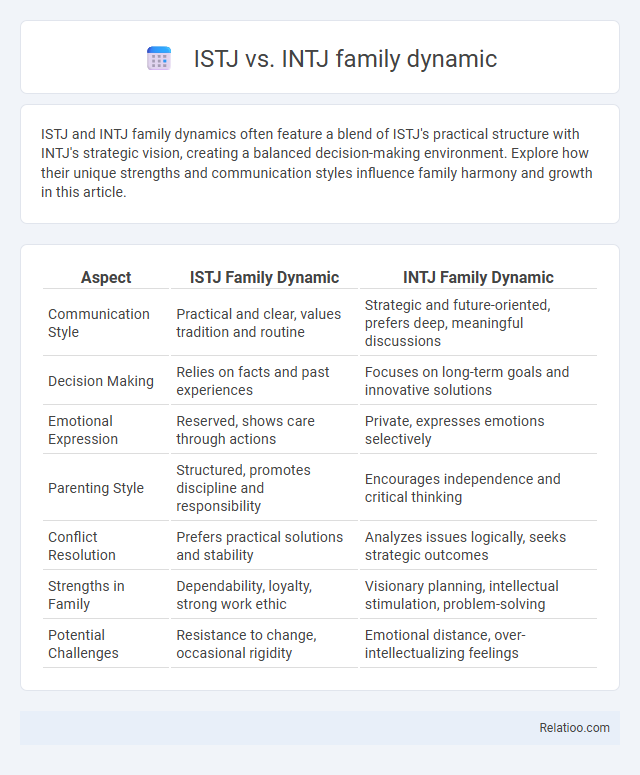ISTJ and INTJ family dynamics often feature a blend of ISTJ's practical structure with INTJ's strategic vision, creating a balanced decision-making environment. Explore how their unique strengths and communication styles influence family harmony and growth in this article.
Table of Comparison
| Aspect | ISTJ Family Dynamic | INTJ Family Dynamic |
|---|---|---|
| Communication Style | Practical and clear, values tradition and routine | Strategic and future-oriented, prefers deep, meaningful discussions |
| Decision Making | Relies on facts and past experiences | Focuses on long-term goals and innovative solutions |
| Emotional Expression | Reserved, shows care through actions | Private, expresses emotions selectively |
| Parenting Style | Structured, promotes discipline and responsibility | Encourages independence and critical thinking |
| Conflict Resolution | Prefers practical solutions and stability | Analyzes issues logically, seeks strategic outcomes |
| Strengths in Family | Dependability, loyalty, strong work ethic | Visionary planning, intellectual stimulation, problem-solving |
| Potential Challenges | Resistance to change, occasional rigidity | Emotional distance, over-intellectualizing feelings |
Understanding ISTJ and INTJ Personality Types
ISTJ personalities in family dynamics emphasize tradition, responsibility, and practical support, often ensuring stability and clear roles, while INTJ family members prioritize strategic planning, independence, and innovative problem-solving, challenging norms for long-term improvement. Understanding ISTJ traits involves appreciating their focus on loyalty and routine, whereas recognizing INTJ traits requires valuing their visionary mindset and desire for intellectual growth. Balancing these differences improves communication and fosters mutual respect within diverse family roles.
Core Differences Between ISTJ and INTJ Family Members
ISTJ family members prioritize tradition, structure, and practical responsibilities, often taking on dependable roles within household routines and ensuring stability. INTJ family members focus on long-term planning, strategic thinking, and fostering independence, tending to challenge established norms and encourage innovation in family decisions. Core differences include ISTJs' emphasis on duty and reliability versus INTJs' preference for visionary goals and intellectual growth within the family dynamic.
Communication Styles: ISTJ vs INTJ in the Family
ISTJ family members prioritize clear, practical communication focused on traditions and responsibilities, often relying on established routines to resolve conflicts and maintain harmony. INTJ individuals approach family interactions with strategic thinking, emphasizing long-term goals and abstract ideas, which can lead to analytical but less emotionally expressive exchanges. The ISTJ's detail-oriented, fact-based style contrasts with the INTJ's visionary and conceptual approach, requiring mutual understanding to bridge differences in emotional expression and problem-solving within the family dynamic.
Decision-Making Approaches in ISTJ and INTJ Households
ISTJ family decision-making relies on practical tradition, valuing consistency and proven methods to maintain stability in the household. INTJ households prioritize strategic planning and long-term vision, often approaching decisions with innovative and future-focused solutions. Your understanding of these distinct approaches helps foster collaboration by balancing ISTJ's structured reliability with INTJ's analytical foresight.
Problem-Solving and Conflict Resolution Dynamics
ISTJ family dynamics emphasize structured problem-solving with a focus on practical solutions and maintaining tradition, ensuring conflicts are resolved through clear rules and past experiences. INTJ family dynamics approach conflicts analytically, prioritizing long-term strategies and innovative ideas to address underlying issues. Your family's problem-solving style can blend ISTJ's methodical approach with INTJ's visionary mindset, leading to more balanced and effective conflict resolution.
Emotional Expression and Support: ISTJ vs INTJ
ISTJ family members prioritize dependable, practical support with clear roles, showing love through consistent actions rather than verbal emotional expression. INTJs tend to offer emotional support through strategic problem-solving and intellectual understanding, often keeping feelings private while encouraging self-reliance in family relationships. Your family dynamic will differ by valuing ISTJ stability and routine or INTJ independence and insight, impacting how emotional needs are interpreted and met.
Parenting Styles: ISTJ Parent vs INTJ Parent
ISTJ parents emphasize structure, consistency, and practical routines, fostering a stable family environment where rules and responsibilities are clearly defined. INTJ parents prioritize strategic planning and intellectual growth, encouraging independence and critical thinking within the family dynamic. Both parenting styles value competence and long-term success but differ in their approach: ISTJs focus on tradition and duty, while INTJs emphasize innovation and autonomy.
Handling Traditions and Change in the Family
ISTJ family dynamics prioritize preserving traditions and maintaining established routines, valuing consistency and reliability in family roles and celebrations. INTJs approach family change strategically, embracing innovation and adapting traditions to align with long-term goals and efficient problem-solving. While ISTJs emphasize honoring the past, INTJs focus on evolving family practices to improve future outcomes.
Building Harmony and Mutual Respect
ISTJ family dynamics emphasize structure and tradition, fostering harmony through consistent routines and clear expectations that build trust and mutual respect. INTJ family environments prioritize strategic problem-solving and future planning, encouraging open intellectual dialogue and respect for individual autonomy. Combining these traits supports a balanced home where practical stability aligns with visionary goals, enhancing mutual respect and cohesive relationships.
Tips for Strengthening ISTJ-INTJ Family Relationships
ISTJ and INTJ family dynamics often balance practicality with strategic vision, where ISTJs provide structure and routine while INTJs contribute long-term planning and innovation. Understanding and respecting each other's communication styles--ISTJ's preference for concrete facts and INTJ's abstract insights--strengthens collaboration and reduces conflicts. Prioritizing clear expectations, shared goals, and regular, honest conversations fosters mutual support and deepens family bonds.

Infographic: ISTJ vs INTJ family dynamic
 relatioo.com
relatioo.com